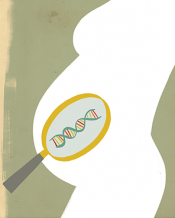Genetic Embryo Screening for Psychiatric Risk Not Supported by Evidence, Ethically Questionable
By Jenny Logan,
Mad in America
| 09. 02. 2022
At least one private company has begun offering services to allow parents undergoing in-vitro fertilization (IVF) to screen embryos for complex genetic risks with a procedure called polygenic embryo screening (PES). Although genetic testing of embryos for the risk of some severe diseases with known strong genetic links (cystic fibrosis or Tay-Sachs, for instance) has existed for decades, PES is a new form of screening that these companies claim can identify the risk for complex medical problems, including psychiatric disorders, that do not have specific known risk genes.
However, this approach lacks scientific validity and brings up a host of ethical issues, according to a new article in top-tier psychiatric journal Lancet Psychiatry.
“We are concerned that these tests are being marketed with limited empirical data behind them and virtually no scientific or ethical discussion. Without more research, it is unlikely that medical providers and the general public will have sufficient understanding to evaluate the pros and cons of this technology,” the researchers write.
The authors were led by Todd Lencz, a prolific expert on the genetics of...
Related Articles
By Diaa Hadid and Shweta Desai, NPR | 01.29.2026
MUMBRA, India — The afternoon sun shines on the woman in a commuter-town café, highlighting her almond-shaped eyes and pale skin, a look often sought after by couples who need an egg to have a baby.
"I have good eggs,"...
By Steve Rose, The Guardian | 01.28.2026
Ed Zitron, EZPR.com; Experience Summit stage;
Web Summit 2024 via Wikipedia Commons licensed under CC by 2.0
If some time in an entirely possible future they come to make a movie about “how the AI bubble burst”, Ed Zitron will...
By Arthur Lazarus, MedPage Today | 01.23.2026
A growing body of contemporary research and reporting exposes how old ideas can find new life when repurposed within modern systems of medicine, technology, and public policy. Over the last decade, several trends have converged:
- The rise of polygenic scoring...
By Daphne O. Martschenko and Julia E. H. Brown, Hastings Bioethics Forum | 01.14.2026
There is growing concern that falling fertility rates will lead to economic and demographic catastrophe. The social and political movement known as pronatalism looks to combat depopulation by encouraging people to have as many children as possible. But not just...




